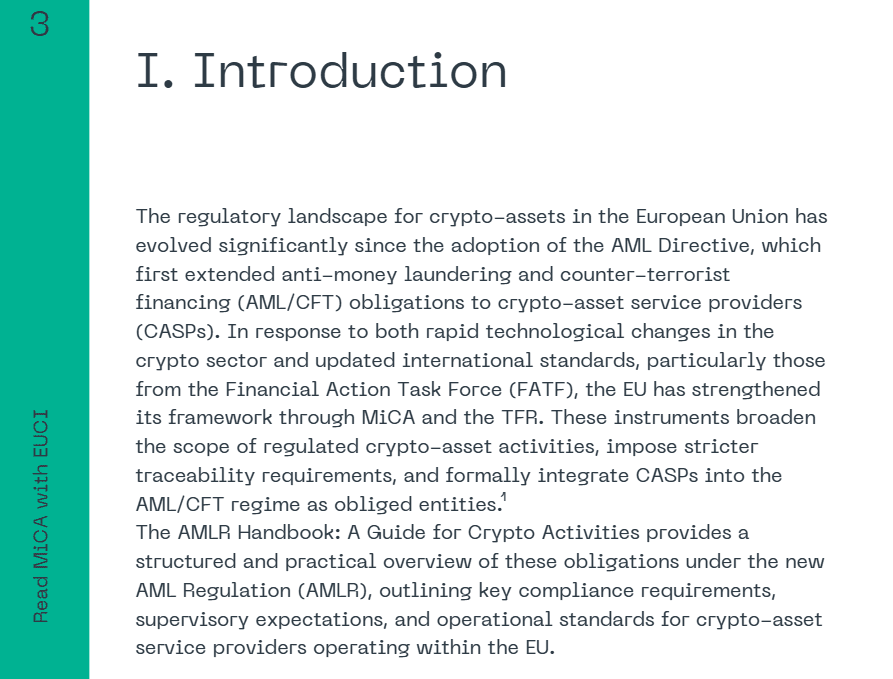European Union to Ban Anonymous Crypto and Privacy Tokens by 2027: A Comprehensive Overview
The European Union is implementing stringent Anti-Money Laundering (AML) rules that will significantly impact the cryptocurrency landscape. By 2027, privacy-preserving tokens and anonymous cryptocurrency accounts will be banned across the EU. This move aims to increase transparency and combat financial crime within the digital asset space.
Key Aspects of the Anti-Money Laundering Regulation (AMLR)
The new Anti-Money Laundering Regulation (AMLR) will affect credit institutions, financial institutions, and crypto asset service providers (CASPs). Article 79 of the AMLR specifically prohibits these entities from maintaining anonymous accounts or handling privacy-preserving cryptocurrencies such as Monero (XMR) and Zcash (ZEC). This regulation is designed to prevent the use of cryptocurrencies for illicit activities.
According to the AML Handbook published by the European Crypto Initiative (EUCI), the regulation extends beyond just cryptocurrencies to include bank and payment accounts, passbooks, safe-deposit boxes, and any accounts allowing for anonymization of transactions.

Impact on Crypto Service Providers (CASPs)
The new regulations will require CASPs to implement robust Know Your Customer (KYC) and Anti-Money Laundering (AML) procedures. This includes conducting thorough customer due diligence and monitoring transactions for suspicious activity. CASPs operating in at least six member states will face direct AML supervision.
EU to Increase Oversight of Crypto Service Providers
The EU is set to increase its oversight of crypto service providers (CASPs). The Anti-Money Laundering Authority (AMLA) plans to directly supervise entities operating in multiple member states. In the initial stage, AMLA intends to select 40 entities, ensuring at least one entity per member state. This selection process is scheduled to commence on July 1, 2027.
AMLA will employ “materiality thresholds” to identify firms with a substantial presence in multiple jurisdictions for direct supervision. These thresholds include a minimum of 20,000 customers residing in the host member state or a total transaction volume exceeding 50 million euros ($56 million).
Customer Due Diligence and Transaction Limits
Another notable measure is the mandatory customer due diligence required for transactions above 1,000 euros ($1,100). This measure aims to enhance transparency and reduce the potential for illicit financial activities.
Broader AML Framework and Implementation
Vyara Savova, senior policy lead at the EUCI, explained that the regulations (AMLR, AMLD, and AMLAR) are final, with the remaining details being the interpretation of requirements through implementing and delegated acts, primarily handled by the European Banking Authority.
The EUCI is actively involved in shaping these level two acts by providing feedback to public consultations. Savova emphasized that centralized crypto projects (CASPs under MiCA) need to consider the broader framework when establishing their internal processes and policies.
Rationale Behind the Ban
The EU’s decision to ban anonymous crypto and privacy tokens is driven by several key factors:
- Combating Money Laundering: Anonymous cryptocurrencies are often used to conceal the origin and destination of funds, making it difficult to trace illicit activities.
- Preventing Terrorist Financing: Anonymous transactions can be exploited by terrorist groups to fund their operations without detection.
- Ensuring Regulatory Compliance: The EU aims to create a level playing field for all financial institutions and ensure that crypto assets are subject to the same AML and KYC standards as traditional financial products.
- Protecting Consumers: Anonymous crypto transactions can expose consumers to fraud and scams, as there is limited recourse in case of disputes or losses.
Implications for the Crypto Industry
The ban on anonymous crypto and privacy tokens is expected to have significant implications for the crypto industry in Europe:
- Increased Compliance Costs: Crypto businesses will need to invest in more robust AML and KYC systems to comply with the new regulations.
- Reduced Anonymity: Users of crypto assets will have to provide more personal information and undergo identity verification processes.
- Potential Shift to Privacy Coins: Some users may migrate to cryptocurrencies with enhanced privacy features, such as Monero and Zcash, which could face increased scrutiny from regulators.
- Innovation and Development: The EU’s regulatory framework could encourage the development of innovative solutions for AML and KYC in the crypto space.
MiCA and Further Regulatory Measures
These updates are part of the EU’s ongoing efforts to regulate the crypto industry, building on previous measures such as the Markets in Crypto-Assets Regulation (MiCA). MiCA aims to provide a comprehensive legal framework for crypto assets, covering areas such as issuance, trading, and custody.
Conclusion
The European Union’s decision to ban anonymous crypto and privacy tokens marks a significant step towards greater regulation of the crypto industry. While the move aims to combat financial crime and protect consumers, it also presents challenges for crypto businesses and users. The industry will need to adapt to the new regulatory landscape and embrace greater transparency and compliance.